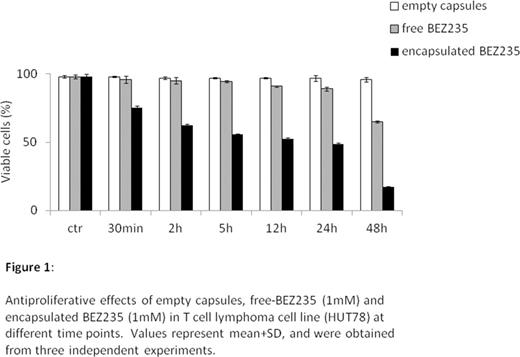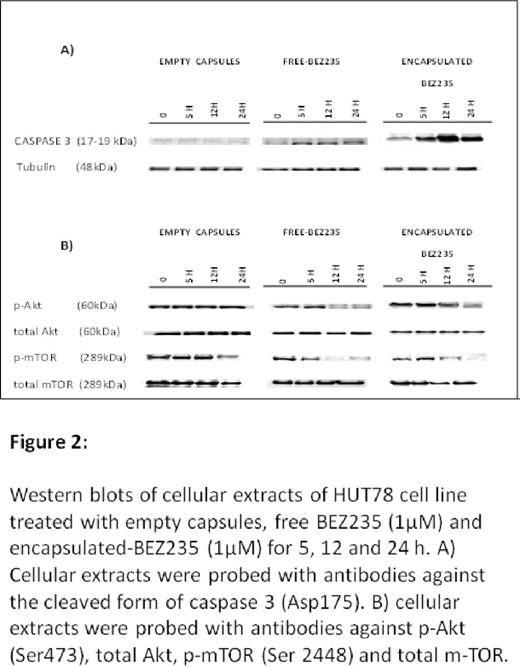Abstract
Nanotechnology is a promising branch of the medical field, directed to improve diagnostic and therapeutics strategies, applying nanovectors as drug delivery systems. Efficient encapsulation of anticancer drugs in nanocolloids and microcapsules was recently developed by G. Ciccarella research group (1). Based on our collaboration with the Nantional Nanotechnology Laboratory of the University of Salento and our previous experience with target therapies, we encapsulated BEZ235, a phosphatidylinositol 3-kinase (PI3K)/Akt/mammalian target of rapamycin inhibitor (mTOR). BEZ235 efficiently blocks the dysfunctional activation of the PI3K/mTOR pathway in cellular and in vivo settings, thus inhibiting the growth and proliferation of various cancer cells, and phase I/II clinical trials were open in solid cancer. However the scarse solubility limited further development of this promising compound. In order to overcome the solubility issue BEZ235-loaded nanocapsules were generated by the stepwise adsorption of oppositely charged polyelectrolytes into biocompatible CaCO3 cores. First nanocapsules were tested for biocompatibility. The exposition of lymphoma cell lines to empty nanocapsules up to 48 hours, did not induce any cititoxicity, confirming their biocompatibility. Second, encapsulated BEZ235 was compared with free-drug to test the cytotoxicity in a T lymphoma cell line (HUT78) by MTT assay (Fig. 1). The results suggested that nanoencapsulated-BEZ235 was extremely efficient compared with free-BEZ235, reaching IC50 just after 5 hours of exposure compared with an IC65% at 48 hours with the free drug. A validated LC-MS/MS method was developed in order to quantify intracellular concentration of BEZ235 over time. Intracellular concentration of BEZ235 in the lymphoma cell line was consistent with biological results since the internalization kinetic and efficiency was increased by the coating. In order to confirm that the encapsuled-BEZ235 was still effective on cell apoptosis, we tested free BEZ and encapsulated BEZ235 at a concentration of 1µM in T cell lymphoma cell lines. Encapsulated-BEZ235 induced apoptosis evidenced by the cleavage of caspase 8, 9 and 3 at an earlier time point compared with free BEZ235 and at significantly lower concentration.
We also confirmed that the encapsulated-BEZ235 maintained its effect on the target mTOR/AKT pathway: p-AKT was dephosphorylated at 5h while the free BEZ235 operates at least after 24 hours at concentrations 100 times higher, as previously demonstrated (2).
Keeping in mind a future clinical application of these polymeric particles/capsules, our data can be regarded as a promising new nanotechnology-based strategy to improve the efficacy and bioavailability of old and new drugs. Functional biological studies of BEZ235-encapsulated carrier and its mechanism of internalization are already under way, and animal in vivo studies to evaluated toxicity and distribution of the nanocapsuled compound are ongoing.
1 F. Baldassare et al., Macromolecular Bioscience, Volume 12, Issue 5, pages 656-665, 2012
2 Civallero M, Cosenza M, Marcheselli L, Pozzi S, Sacchi S. Expert Opin Investig Drugs. 2012 Nov;21(11):1597-606.
No relevant conflicts of interest to declare.
Author notes
Asterisk with author names denotes non-ASH members.



This feature is available to Subscribers Only
Sign In or Create an Account Close Modal